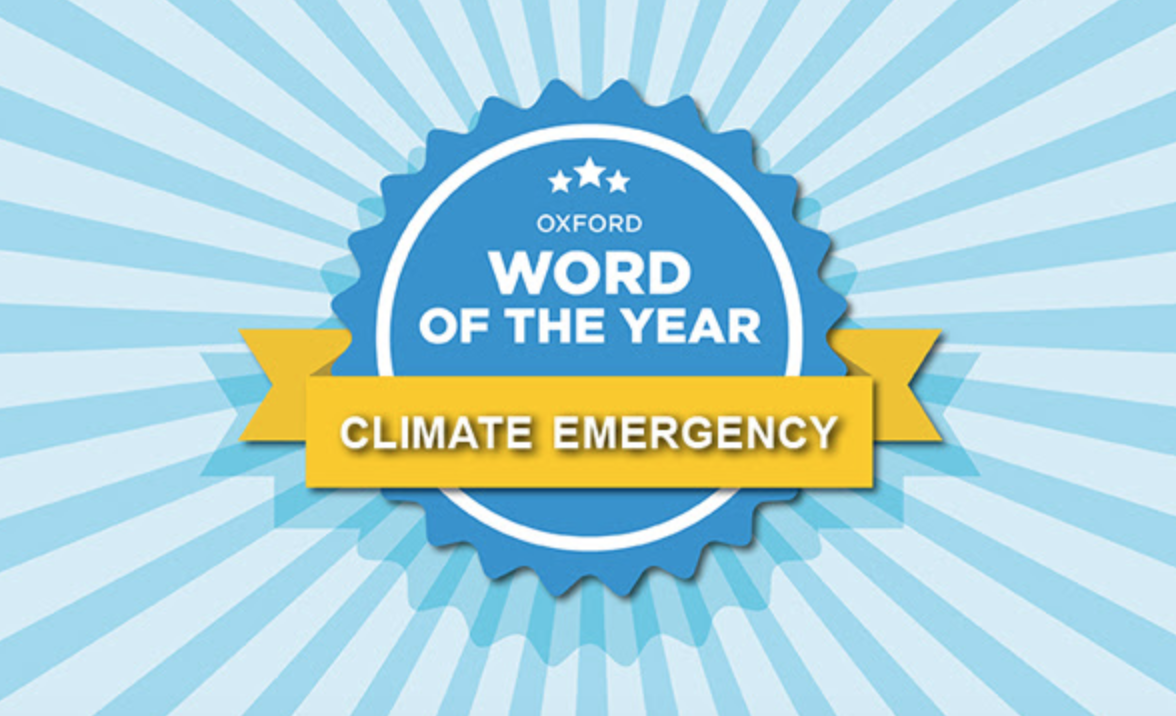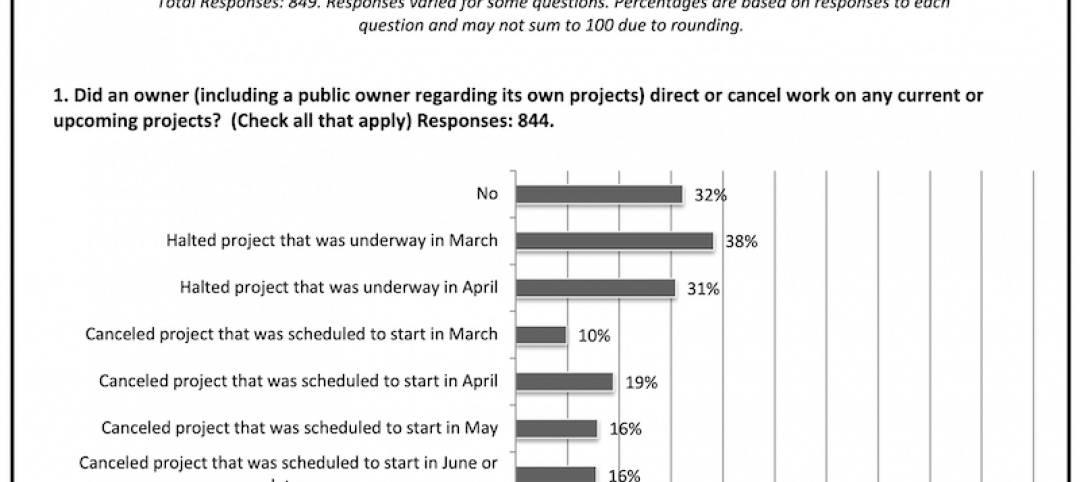 The Oxford Word of the Year 2019 is climate emergency. (Isn't that two words?) That news comes from the folks who produce the Oxford English Dictionary. They track word usage via something they call the "Oxford Corpus." Last year's OWOTY was toxic; 2017's was youthquake (look it up).
The Oxford Word of the Year 2019 is climate emergency. (Isn't that two words?) That news comes from the folks who produce the Oxford English Dictionary. They track word usage via something they call the "Oxford Corpus." Last year's OWOTY was toxic; 2017's was youthquake (look it up).
By the way, if you're looking for a fascinating book, Simon Winchester's The Meaning of Everything: The Story of the Oxford English Dictionary (better than his earlier work on the topic, The Professor and the Madman).
Here's the full announcement from the OED people:
The Oxford Word of the Year is a word or expression shown through usage evidence to reflect the ethos, mood, or preoccupations of the passing year, and have lasting potential as a term of cultural significance.
Climate emergency is defined as ‘a situation in which urgent action is required to reduce or halt climate change and avoid potentially irreversible environmental damage resulting from it.’
This year, heightened public awareness of climate science and the myriad implications for communities around the world has generated enormous discussion of what the UN Secretary-General has called ‘the defining issue of our time’.
But it is not just this upsurge in conversation that has caught our attention. Our research reveals a demonstrable escalation in the language people are using to articulate information and ideas concerning the climate. This is most clearly encapsulated by the rise of climate emergency in 2019.
HOW THE OXFORD ENGLISH DICTIONARY CHOOSES THE WORD OF THE YEAR
Analysis of language data collected in the Oxford Corpus shows the rapid rise of climate emergency from relative obscurity to becoming one of the most prominent – and prominently debated – terms of 2019.
Usage of the phrase climate emergency increased steeply over the course of 2019, and by September it was more than 100 times as common as it had been the previous year.

Sourced from the Oxford Corpus
The word climate has been central to 2019 overall, and features in a number of prominent phrases, but climate emergency stands out for a number of reasons. Statistically speaking, this represents a new trend in the use of the word emergency.
In 2018, climate did not feature in the top words typically used to modify emergency, instead the top types of emergencies people wrote about were health, hospital, and family emergencies. These suggest acute situations of danger at a very personal level, often relating to the health of an individual. Emergency also frequently occurs, as in the phrase state of emergency to indicate a legal declaration of an acute situation at a jurisdictional level. But with climate emergency, we see something new, an extension of emergency to the global level, transcending these more typical uses.
In 2019, climate emergency surpassed all of those other types of emergency to become the most written about emergency by a huge margin, with over three times the usage frequency of health, the second-ranking word.
Looking at the equivalent data for climate collocations, climate crisis and climate action – both of which are included in our Word of the Year 2019 shortlist – feature alongside climate emergency as the words most typically used to modify climate in 2019, as recorded in our corpus. All of these words have exceeded more moderate or speculative pairings like climate variability and climate prediction, and expected connections like climate scientist, which have dominated the usage data for more than 10 years.
This data is significant because it indicates a growing shift in people’s language choice in 2019, a conscious intensification that challenges accepted language use to reframe discussion of ‘the defining issue of our time’ with a new gravity and greater immediacy.
HOW 'CLIMATE CHANGE' MORPHED INTO 'CLIMATE EMERGENCY'
One high profile example of this language development is the changes made by The Guardian in its reporting of environmental news in May. The newspaper stated that instead of climate change, its preferred terms are ‘climate emergency, crisis, or breakdown’ to describe the broader impact of climate change. The move prompted other media outlets to review and update their own policies and approaches to reporting on the climate.
The Guardian’s editor-in-chief Katharine Viner, who outlined the terminology changes, said: ‘We want to ensure that we are being scientifically precise, while also communicating clearly with readers on this very important issue. The phrase “climate change”, for example, sounds rather passive and gentle when what scientists are talking about is a catastrophe for humanity.’
Language choice in scientific reporting on climate science has been influential in this shift during 2019. With the publication of careful scientific analyses presenting the various consequences for the world’s communities should people fail to take action – see the Intergovernmental Panel on Climate Change’s special report Global Warming of 1.5 ºC, for example – an increasing number of climate scientists have urged their peers to ‘tell it like it is’ when communicating their research.
A recent article published in the journal BioScience and signed by 11,258 scientists from 153 countries argued that ‘scientists have a moral obligation to clearly warn humanity of any catastrophic threat’, and presented their research to declare ‘clearly and unequivocally that planet Earth is facing a climate emergency.’
Similar action has been taken in political circles this year, with a growing number of local and national jurisdictions officially declaring a state of climate emergency. On 28 April 2019, Scottish First Minister Nicola Sturgeon became the first to declare a national climate emergency on behalf of the Scottish government in a party conference address. This was swiftly followed by official declarations from the UK, Portugal, Canada, France, and Argentina among others. Such a move has been likened to putting a country on ‘war footing’, a demonstration of commitment to combat the emergency by putting climate action at the centre of governmental policy.
Counter-climate emergency
The conspicuous rise of climate emergency in 2019 has also incurred debate over its merit and validity as a descriptor of the current environmental state.
Where many jurisdictions have declared climate emergencies, some have argued against formal declaration due to concerns that this hardening of language would alienate, rather than activate, a general public whose buy-in is needed to prevent disaster. In Canada, for example, Guelph city councillors narrowly voted to ‘acknowledge a climate crisis’, having changed the wording of the motion from ‘declare’ to ‘acknowledge’ and ‘emergency’ to ‘crisis’ in a bid to find common ground.
There has also been alarm over the implications of the growing number of ‘well-meaning’ declarations of a climate emergency. The writer Arundhati Roy, for example, observed an increasingly ‘militarized’ vocabulary around climate change in her Arthur Miller Freedom to Write lecture, delivered in May 2019. She raised concerns over the formalization of the climate emergency, which she suggested would ‘exclude most of the world to place the decision making straight back into the den of the same old suspects’ – the centres of power which had neglected or profited from climate change for decades.
While some acknowledge climate emergency but harbour concerns over the language choice, some in the scientific community question the validity of climate emergency as an appropriate term at all. A group called the Climate Intelligence Foundation, for example, addressed a letter to the UN Secretary-General during the Climate Action Summit in September, 2019 arguing that ‘there is no climate emergency’. The letter has been criticised for utilising arguments long-since debunked by climate science authorities around the world; such debate still, however, contributed to the rise and dissemination of climate emergency as one of the most talked about terms of 2019.
OTHER WORDS THAT MADE THE WORD OF THE YEAR SHORTLIST
All around the world in 2019, people have been talking and writing about the state of our climate, the implications of current climate science, and proposed solutions for averting ecological disaster.
Analysis of language data recorded in the Oxford Corpus shows how this global preoccupation has permeated different domains, uniting key issues from farming to mental health, air travel to legal campaigns, under the umbrella of the great climate debate.
Climate emergency may lead the pack, but this year our Word of the Year shortlist reflects the prominence of climate-related language documented in our corpus.
- Climate action
Actions taken by an individual, organization, or government to reduce or counteract the emission of carbon dioxide and other greenhouse gases, in order to limit the effect of global warming on the earth’s climate
Our corpora record a 266% rise in usage over last year, with a dramatic spike in September documenting demands for climate action by protestors at climate rallies around the globe and media coverage of the gathering of world leaders for the UN’s Climate Action Summit in New York.
- Climate crisis
A situation characterized by the threat of highly dangerous, irreversible changes to the global climate
Like climate emergency, climate crisis is increasingly favoured as a more scientifically robust term for climate change across climate science and media reporting, resulting in a 26-fold increase in usage in 2019.
- Climate denial
The rejection of the proposition that climate change caused by human activity is occurring or that it constitutes a significant threat to human welfare and civilisation
Our data reveals a 153% usage increase for climate denial in 2019, reflecting debate over climate science reporting and leading political figures’ reactions to it, and the hardening of language from scepticism to denial, with people typically described as climate science deniers or climate deniers instead of climate sceptics.
Though yet to reach the heights of November 2018 – likely coinciding with media coverage of President Trump’s denial of his own government’s climate report, among others – climate denial, and associated terms, has been ever-present this year.
- Eco-anxiety
Extreme worry about current and future harm to the environment caused by human activity and climate change
Our corpus records a 4,290% increase in use eco-anxiety in 2019, showing a growing discourse, particularly among young people, around the mental health impact of the climate emergency that has dominated headlines this year. While the symptoms are the same as clinical anxiety, eco-anxiety is not considered by mental health professionals to be a mental disorder as the cause of the worry is a rational response to current climate science reporting.
- Ecocide
Destruction of the natural environment by deliberate or negligent human action
Amidst heightened public attention to the climate emergency and calls for action, the word ecocide has had a 680% increase in frequency of use over 2019. The term is at the heart of a legal campaign to make serious damage to the environment an atrocity crime at the International Criminal Court, putting it on an equal footing with genocide, war crimes, and crimes against humanity. Such a move would make government officials and business leaders individually criminally responsible for actions that knowingly or negligibly harm the planet.
The spike in April perhaps reflects increased coverage after the death of Polly Higgins, a British barrister and leading figure of the decade-long campaign for ecocide to be recognised as a criminal, rather than civil, offense.
- Extinction
The fact or process of a species, family, or other group of animals or plants becoming extinct
Extinction has seen a 681% increase in usage in 2019 as scientific analyses report on the breakdown of our planet’s biodiversity attributed to human activity. The UN’s Global Assessment Report, for example, stated that ‘human actions threaten more species with global extinction now than ever before’.Our language data records a huge spike in usage in April that corresponds with launch of Extinction Rebellion, the international movement using civil disobedience tactics to generate public awareness and secure political change to combat environmental breakdown.
- Flight shame
A reluctance to travel by air, or discomfort at doing so, because of the damaging emission of greenhouse gases and other pollutants by aircraft
Flight shame is a translation of the Swedish flygskam, a phenomenon that took off across Europe early this year before going global, resulting in a 182% rise in usage. Growing attention to individuals’ carbon footprints has seen people ditching carbon-intensive air travel for other, greener forms of transport, and the introduction of recommendations for a ‘frequent flyer levy' to curb the ever-growing demand for air travel.
Climate activist Greta Thunberg, another Swedish export alongside flygskam, led by example in September when she made the two-week transatlantic journey from Plymouth in the UK to reach New York in the US for the UN’s Climate Action Summit.
- Global heating
A term adopted in place of ‘global warming’ to convey the seriousness of changes in the climate caused by human activity and the urgent need to address it
In December 2018, Prof Richard Betts, the UK Met Office’s climate research lead, advised: ‘global heating is technically more correct because we are talking about changes in the energy balance of the planet’. This year, our data shows the uptake of this revised terminology, presenting an 18,358% usage rise in 2019 over the same period last year as record-breaking temperatures and concern over the future of the Paris Agreement hit headlines around the world.
- Net-zero
A target of completely negating the amount of greenhouse gases produced by human activity, to be achieved by reducing emissions and implementing methods of absorbing carbon dioxide from the atmosphere
In June 2019, the UK became the first major economy to pass a net-zero law, and more than 60 countries have since pledged to achieve net-zero emissions by 2050. However, as initial analysis indicates urgent action is required to meet this target, debate as what action should be taken has contributed to a 992% usage rise for the term in 2019.
- Plant-based
(Of food or a diet) consisting largely of vegetables, grains, pulses, or other foods derived from plants, rather than animal products
From lab-grown chicken to meatless burgers, 2019 has seen increased frequency of discussion of all things plant-based with the trend for clean meat, meat alternatives, vegetarianism, and veganism contributing to the 144% usage increase. Coverage of the Amazon rainforest wildfires in August, for example, brought renewed attention to damaging farming practices driven by high global demand for beef and a surge of people talking about sustainable alternatives.
More from Author
Rob Cassidy | Mar 30, 2020
Your turn: Has COVID-19 spelled the death knell for open-plan offices?
COVID-19 has designers worrying if open-plan offices are safe for workers.
Rob Cassidy | Mar 25, 2020
Coronavirus pandemic's impact on U.S. construction, notably the multifamily sector - 04-30-20 update
Coronavirus pandemic's impact on U.S. construction, notably the multifamily sector - 04-30-20 update
Rob Cassidy | Nov 8, 2019
The Peloton Wars, Part III - More alternatives for apartment building owners
ProForm Studio Bike Pro review.
Rob Cassidy | Nov 1, 2019
Do car-free downtown zones work? Oslo, yes; Chicago, no
Two recent reports (October 2019) explore whether car-free downtowns really work, based on experience in Oslo, Norway, and Chicago.
Rob Cassidy | Oct 9, 2019
Multifamily developers vs. Peloton: Round 2... Fight!
Readers and experts offer alternatives to Peloton bicycles for their apartment and condo projects.
Rob Cassidy | Sep 4, 2019
Peloton to multifamily communities: Drop dead
Peloton will no longer sell its bikes to apartment communities.
Rob Cassidy | Sep 3, 2019
Top 10 indoor amenities in multifamily developments for 2019
In-unit washer/dryer heads our ranking of the top indoor amenities in multifamily housing developments.
















